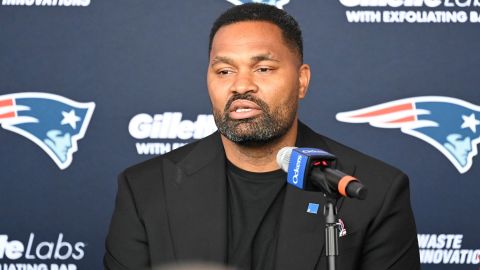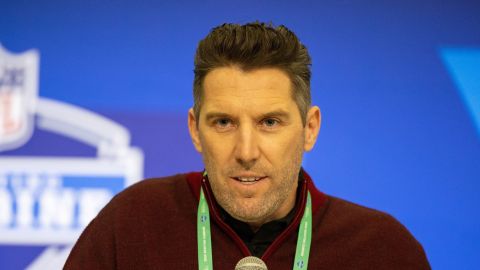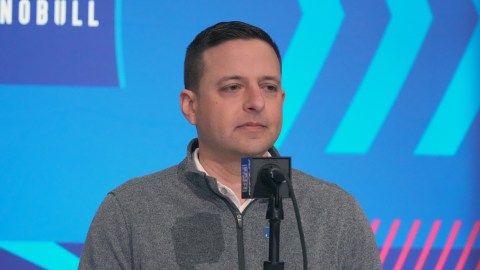Offensive play-calling is an art. When done right, its work can be put on display in museums. When done poorly — which was the case last season in New England — it looks like a sloppy refrigerator paper.
A great offensive coordinator is invaluable. Charlie Weis basically overhauled the Patriots’ playbook in 2001 during a transition from the strong-armed Drew Bledsoe to the green-eared Tom Brady. Weis helped Brady grow over four seasons, and the Patriots won three Super Bowls as a result. In turn, Weis got a fat paycheck to take over Notre Dame’s program.
Josh McDaniels took over Weis’ duties and eventually orchestrated the Patriots’ record-breaking offense in 2007 before transforming Matt Cassel from a seven-year backup into a guy who deserved a 2008 Pro Bowl nod. After that, McDaniels was hired by the Denver Broncos as Mike Shanahan’s successor. In the last decade or so, Sean Payton, Brian Billick, Todd Haley, Gary Kubiak and Mike Martz are a handful of others who were brilliant offensive coordinators and managed to turn those gigs into head coaching stints.
Meanwhile, a poor offensive coordinator can be a real hindrance. It’s not all about drawing up plays and calling them from the sideline or coaches’ box. The offensive coordinator — or the de facto play-caller, in the 2009 Patriots’ case — must be able to adjust on the fly and show some assertion when sending the plays to the quarterback.
The Patriots struggled too often in each area last season, and there’s no question they’ve got to make serious improvements in 2010. Quarterbacks coach Bill O’Brien was heavily responsible for the play-calling last season — both in practice and during games — and head coach Bill Belichick recently indicated on the Patriots’ team Web site that O’Brien will serve in a similar role next season.
It wasn’t all on O’Brien, though. Running back Kevin Faulk told NESN.com in December that Belichick had a role in the play-calling. Also, director of player personnel Nick Caserio may have inadvertently tipped his hand on a conference call last season that he shared some involvement in the play-calling.
As a result, the lines of communication seemed to get crossed up at different points throughout the season. Brady was hit with a number of delay-of-game flags, and there were key fourth-down moments in the final minutes of games against the Indianapolis Colts and Miami Dolphins when the Pats burned timeouts because no one was on the same page.
Belichick has said job titles can be overrated, and on the surface, officially naming an offensive coordinator isn’t too big of a deal. However, Belichick should delegate the coordinating responsibilities to one person (the job title should be a nice badge of honor for that person, too) to eliminate the confusion. As one team source said, there was some "frustration" on the offensive side of the ball, and there was a "big [philosophical] difference" in terms of their execution patterns.
Granted, the Patriots scored 26.7 points per game in 2009, which ranked sixth in the NFL, and they did that while Brady played in his first season since undergoing major knee surgery. But there were definitely some deficiencies. For starters, the Patriots only converted seven of their 31 third-down attempts in the second half of their losses last season. That’s not an adjustment problem — that’s an adjustment disaster.
The Patriots weren’t very imaginative with trick plays, either, but with Brady, Randy Moss and Wes Welker running that system, trick plays aren’t always completely necessary. Surely, if they could go to the well with something more than the occasional flea-flicker or end-around, it could help keep defenses off balance, but the development of a trick play consumes a good chunk of time in practices and meeting sessions.
A bigger issue was the Patriots’ lack of dedication to the running and screen game. They certainly ran the ball more in December, but they went away from the ground game too often in the second half when it was working, particularly against the Colts.
And where was the screen game? This was a team that thrived off screen passes — to running backs, wide receivers and tight ends alike — for half a decade. It’s an extension of the running game, and it would have greatly helped Brady, who suffered at least two rib injuries last season, according to a team source. He also broke his finger during a December practice after hitting it on a teammate’s helmet while following through on a pass attempt, according to a source. Point being, Brady could have used a few extra plays per game when he didn’t take a hard hit.
The Patriots were spoiled with a once-in-a-lifetime offense in 2007, and it’s possible they had a tough time adjusting to a simpler system in 2009. Perhaps they had to swallow a bit of pride and realize they weren’t capable of posting 36.8 points per game last season.
By now, they know that, and it’s up to them to make the appropriate corrections in 2010.



